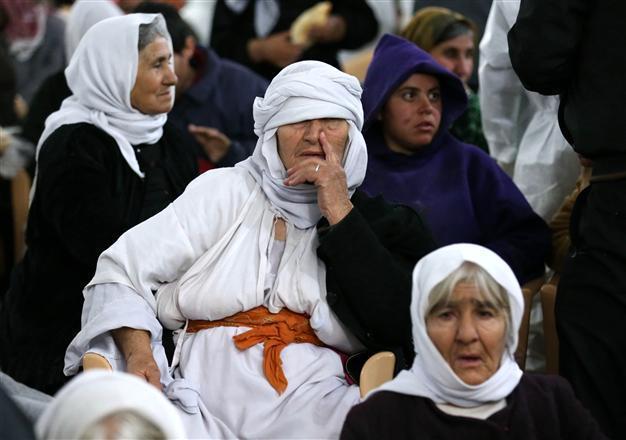ISIL jihadists free 200 elderly Yazidis in north Iraq
ALTUN KOPRI, Iraq - Agence France-Presse

Yazidi women rest at Al-Tun Kopri health centre, located half way between the northern Iraqi city of Kirkuk and Arbil, after they were released with around 200 mostly elderly members of Iraq's Yazidi minority near Kirkuk on January 17, 2015. AFP Photo
The Islamic State of Iraq and the Levant (ISIL) group released more than 200 mostly elderly members of northern Iraq's Yazidi minority Jan. 17 who had been held for months, officials and activists said.
The Yazidis were freed on the front line southwest of the city of Kirkuk and met by Kurdish peshmerga forces who brought them to a health centre in Altun Kopri, on the road to the Kurdish regional capital of Arbil.
"These men and women had been held in Mosul," Khodr Domli, a leading Yazidi rights activist told AFP at the centre. "We already have names for 196 and there could be some more."
"Some are wounded, some have disabilities and many are suffering from mental and psychological problems," he said.
According to officials from Kirkuk and Arbil, the group was moved from Mosul via Hawija and freed at the Khaled entrance to Kirkuk on Saturday.
Dozens of Kurdish doctors and nurses provided emergency care at the Altun Kopri health centre, where Yazidis who had heard the news started to mass at the gates, hoping to be reunited with missing relatives.
"We have dispatched laboratory teams to check their blood, to control for things such as polio and possible contagious diseases," said Saman Barzanji, director general of the Arbil health department.
"Another team is here to handle the people's immediate health needs. We have also deployed ambulance teams to dispatch emergency cases to hospital," he said.
Those freed, some in wheelchairs, others leaning on walking sticks, looked tired and distraught as they waited to give blood samples.
One of them told how they had been moved from one place to another in northern Iraq since being captured in early August.
"It was so hard, not only because of the lack of food but also because I spent so much time worrying," said an old Yazidi man in a rickety wheelchair, wearing a red and white headscarf.
ISIL spearheaded a June offensive that began in Mosul and overran much of Iraq's Sunni Arab heartland north and west of Baghdad, sweeping security forces aside.
After driving south toward Baghdad, ISIL again turned its attention to the north, pushing Kurdish forces back, killing and capturing thousands of Yazidis and twice besieging others on Mount Sinjar.
Officials told AFP the mass release, the largest of its kind, took them by surprise and said there had been no coordination with IS.
"ISIL must have decided that they could no longer feed them, look after them. They were a burden," said Domli.
"ISIL saw that there was no benefit for them in keeping these old people," said Vian Dakhil, a Yazidi member of the Iraqi parliament who made a poignant appeal to the international community for assistance in August.
Days later, US President Barack Obama announced an air campaign and said the threat of a genocide against the Yazidis was one of the main justifications.
Peshmerga and other Iraqi forces, backed by a multinational campaign of air strikes, may have turned the tide against the jihadists.
"The fact that the peshmerga are regaining ground every day must have played a part in the release. ISIL is under pressure and is having to reorganise constantly," Dakhil told AFP.
Hundreds and possibly thousands of Yazidi women and girls have been forced to marry or been sold into sexual slavery by the jihadists, according to Amnesty International.
Dakhil said she thought around 3,000 women and children were still in ISIL captivity.
Most of the survivors at the health centre said they had recently been held at the Shallalat resort on the outskirts of Mosul.
A peshmerga officer said one survivor had told him there were 3,070 of them held there before Saturday's mass release.
"He told me he knew the figure because he overheard ISIL militants mentioning it when discussing the number of meals they had to serve," the officer said.
